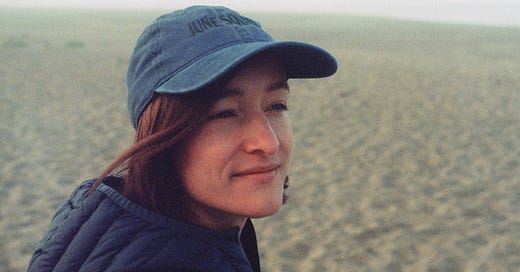The Practice Sessions: Sarah Teresa Cook of For the Birds
on marking transitional moments in time
Hello beautiful human,
I first encountered the words and thoughts of Sarah Teresa Cook at Smallstack (have you checked out the writers of Smallstack? you should). Believing as I do that “Nothing’s small!” right away I felt a connection with this writer and signed up for her column For the Birds. I felt we were similar souls, or “kindred spirits,” as Anne of Green Gables would say. So she was one of the very first people I reached out to when I was imagining what The Practice Sessions could be.
Fortunately for me she was up for the adventure and when I approached her with the idea for a feature, she said yes right away. The whole correspondence has been a gift and I could not be happier to introduce you!
I’m Sarah! I’m a writer, poet, double Taurus, only child, animal lover, amateur bug advocate, and lover of movies & books.
About a year ago, after 3+ decades of enormous confusion about my mental health, I received two diagnoses that changed my life: C-PTSD and autism.
For the past few years, I've earned my living as a self-employed creative mentor, a job that combines my lifelong love of writing, my higher education degrees, and my previous training as a social worker into one role. I love working closely with other sensitive humans as they write the book they’ve been carrying around for years, or build sustainable creative practices that allow them to thrive. I love approaching this through trauma-informed and strengths-based lenses. Most of all, I love that my life now accommodates my own needs as-is—sensory, emotional, energetic, and otherwise.
The Five Questions for the Practice Sessions
What are your current fascinations?
I love this question because I love the assumption that our fascinations necessarily change over time.
I keep a notebook full of lists, and I have a recent one in there called, “What am I preoccupied with?” I’ll transcribe it here:
• bugs + animals (and their welfare)
• in/visibility
• authenticity and truth - the mobility / fluidity of both
• autism
• creativity - how it works - how we feel about it
• language’s domination over experience
• stickers
• comedy
• memory / dreams
What does a “delicious day” consist of, for you?
There’s a role that luck plays in a good day, right? And I say this not from a cynical place, but a grounded one.
For me, the landscape of my mental health and emotional wellbeing is always changing a little, and I often either wake up into a delicious day, or I don’t, in which case it’s about getting through and hoping for something better the next day. This is just how I experience things.
So when I wake up on a good day, here’s what that looks like: I am able to follow my impulses rather than a pre-determined plan. I do a little bit of making (writing), and I also do a lot of reading—a little fiction, a little nonfiction, some philosophy; when my brain can handle it, I love floating in the exact middle of multiple books, letting different forms of intelligence wash over me at once and trusting that I’ll absorb what I need from each. (On bad days, this very same thing overwhelms me.) On good days, I absorb what I need and I let the rest go without fretting. I remember to fill up my gigantic water bottle first thing in the morning, and then to keep it with me as I putter from room to room, moving toward and away from my laptop, where 90% of my work is done. On good days I putter a lot, and I don’t beat myself up for supposedly wasting my time, because my definitions are stretchier and kinder, truer, on good days. I probably cook dinner, and I probably have a really good deep conversation with my partner in the morning, about books or movies or neurodivergence; once a week, I might sneak a tiny sip of coffee from his cup.
How do you take care of yourself?
The most truthful thing I can say is that I’m a 37-year-old woman smack dab in the middle of learning how to take care of herself. This comes after years and years of living a highly masked life in a deep freeze state.
Just like how our preoccupations ebb and flow and change, I think caring for myself looks different depending on the day and time and where I’m at, emotionally speaking. Maybe that’s an obvious thing to say? But I actually think it’s part of what makes self-care so tricky, because I don’t have some Master Plan of Care that I can just consult no matter what. I have to really slow down, almost uncomfortably slow, and look / listen to myself in the moment, doing the hard work to figure out what care looks like on any given day.
In this way, I think what I’m aiming for with self-care is less about consistency and more about authenticity. Too often, I reach for things I “know” should help me feel better, and they don’t, and then I feel stupid or like I’m not trying hard enough or like I don’t even know myself.
So I think the best thing I can do to care for myself is really be with myself exactly how she is, just hear her dark, unkind thoughts, or her swirly confusion, or her panic. And to believe her, believe whatever struggle she is communicating to me, and then go from there.
We are the stories we tell. I’m curious if, at this point, you sense yourself moving into any new stories, or if there are stories you feel you’re recovering?
I misread your question at first as being about stories we’re recovering from :)
Which caused me to write: I am recovering from the story of my incapability.
I think the story being crafted to replace that old belief is one about my innate…and here I’m still looking for the right word. Because it’s more than “potential”—what I’m trying to write a story about is not future-focused or results-oriented. It’s here. Whatever good things I have and am and can offer to the world, I’m looking for the story that says, they’re already here.
Let’s include a gratitude you’d like to share with us…a person, or a place, or something you’d like to express gratitude for who has helped you arrive at this moment.
I sometimes marvel at the traditional relationship practices that dominate our culture. It’s so normal for spouses and partners to complain about each other, for example, making jokes about being trapped or tied down, and I always wonder how much of that is poorly disguised unhappiness. Maybe that’s just my autism taking people at their word.
I want to name my enormous, life-giving gratitude to my partner, Mo, who I’ve been with for almost 11 years now—eleven!—and who has supported me through some of the biggest, hardest, and most exciting and transformative moments of my life. As I steward myself into the person I really am, it’s incredible to be in a partnership that is dominated by mutual growth and unconditional love. To see that our love is not dependent on us staying exactly as we were a decade ago, but that it grows alongside us: that’s what I’m grateful for. The livingness and flexibility of true care.
Share some books you’d recommend?
I've accidentally become obsessed with Reese Witherspoon's Book Club list. My partner is a librarian, and he recently brought home Mother-Daughter Murder Night by Nina Simon for me, thinking it would be a good before-bed read. I just devoured it. It's beautifully written and full of emotional gravity, but maintains a level of comfort and lightheartedness that I found so pleasurable. Then I purchased Throwback, by Maurene Goo, and devoured that one as well. My latest was the compulsively readable The Three Lives of Cate Kay, by Kate Fagan. Highly recommend. Now I find myself actively looking for that dumb little yellow sticker that says, "Reese's Book Club." I guess her and I are just on the same wavelength.
Find Sarah’s book list over at Baker’s Dozen Books.
Keep reading below for the practice Sarah shares with us today, a sixteen minute video demonstrating a practice to mark transitional moments in time.










